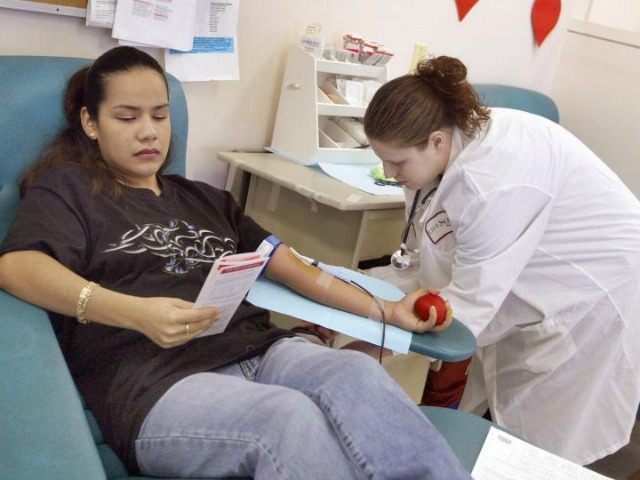The Food and Drug Administration (FDA) has asked people not to donate blood if they recently traveled to countries affected by the Zika outbreak.
“The FDA has critical responsibilities in outbreak situations and has been working rapidly to take important steps to respond to the emerging Zika virus outbreak,” explained Dr. Luciana Borio, the FDA’s acting chief scientist. “We are issuing this guidance for immediate implementation in order to better protect the U.S. blood supply.”
The FDA stated “about 4 or 5 of those infected with Zika virus do not become symptomatic.” According to the FDA:
In areas without active Zika virus transmission, the FDA recommends that donors at risk for Zika virus infection be deferred for four weeks. Individuals considered to be at risk include: those who have had symptoms suggestive of Zika virus infection during the past four weeks, those who have had sexual contact with a person who has traveled to, or resided in, an area with active Zika virus transmission during the prior three months, and those who have traveled to areas with active transmission of Zika virus during the past four weeks.
In areas with active Zika virus transmission, the FDA recommends that Whole Blood and blood components for transfusion be obtained from areas of the U.S. without active transmission. Blood establishments may continue collecting and preparing platelets and plasma if an FDA-approved, pathogen-reduction device is used. The guidance also recommends blood establishments update donor education materials with information about Zika virus signs and symptoms and ask potentially affected donors to refrain from giving blood.
Earlier this month, Brazilian officials reported two cases of Zika infections through blood transfusions in Campinas. Campinas Health Secretary Cármino de Souza said the government was not previously able to confirm the infections “because they were initially suspected of being infected with dengue, another mosquito-borne virus.” The two patients received the blood transfusions in early 2015. The Wall Street Journal reports:
The first case involved a liver-transplant recipient who contracted Zika through blood donated in March 2015. The second was a gunshot victim who tested positive for Zika after receiving multiple blood transfusions; he later died of his wounds, not the Zika virus, Campinas health officials said.
The officials confirmed Zika in the donor’s blood on January 28, 2016.
Another donor from May tested positive for Zika, but “the recipient of the contaminated blood has not developed symptoms of the virus.”
“The capacity of Zika to spread through blood transfusions needs to be evaluated, as well as the blood protection measures that should be adopted based on the new findings,” stated the Brazil Health Ministry.
The U.S. Red Cross has urged people not to donate blood “if they traveled to Latin America or the Caribbean in the past 28 days.” They advised people who have donated blood to alert the organization if they develop Zika symptoms.
“The American Red Cross is dedicated to providing the safest, most reliable blood products possible to patients in need,” stated Susan Stramer, vice president of scientific affairs. “The Red Cross continues to use safety measures to protect the blood supply from Zika and other mosquito-borne viruses.”
The American Association of Blood Banks also recommended people should not donate blood for 28 days.
The FDA also said they will “issue a guidance that will address appropriate donor deferral measures for human cells, tissues, and cellular and tissue-based products (HCT/Ps), given recent reports of sexual transmission of the virus.”
The Dallas County Health and Human Services (DCHHS) confirmed a person received the virus after “sexual contact with an individual with Zika.”
“Now that we know Zika virus can be transmitted through sex, this increases our awareness campaign in educating the public about protecting themselves and others,” explained Zachary Thompson, DCHHS director. “Next to abstinence, condoms are the best prevention method against any sexually-transmitted infections.”

COMMENTS
Please let us know if you're having issues with commenting.